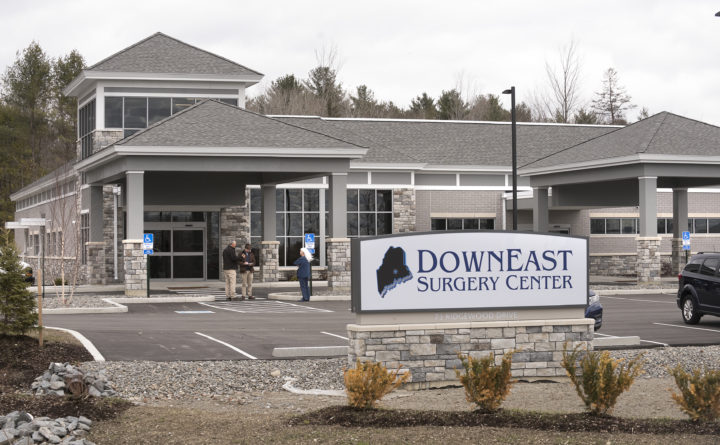
A group of Bangor surgeons has opened a new outpatient surgery center near the Bangor Mall that allows them to more easily do advanced types of surgery, in particular same-day knee, hip and shoulder replacements.
On Wednesday, Downeast Surgery Center officially opens its larger facility at 73 Ridgewood Ave. off Stillwater Avenue, which features three operating rooms, extra storage space and state-of-the-art technology.
The extra space gives the orthopedic surgeons more room to perform outpatient total joint replacements, according to Dr. John Pyne, the president of DownEast Orthopedics, an affiliated medical group that’s located across the street from the new surgical center. Plastic surgeons from Bangor Plastic & Hand will also use the center.
The Bangor surgical center’s expansion is part of a national shift in health care toward freestanding, specialized surgical centers. The shift poses significant competition for local hospitals because some patients might find the setting more appealing than a hospital and because freestanding centers typically offer markedly lower prices.
Whereas many surgeries have traditionally been performed in hospitals on an inpatient basis, changing technology allows independent surgeons to do a small but increasing share of their work in freestanding centers that specialize in particular types of operations, according to John Morrow, managing director of Franklin Trust Ratings, which provides industry data to help health care clients make decisions.
Some of the greatest evidence of that shift has been the handful of vision care centers that have opened between Bangor and Ellsworth, according to Morrow, who lives in Maine and has analyzed the growth of freestanding outpatient surgery centers across the country. Colonoscopies are also among the most common outpatient procedures nationally.
Freestanding surgical centers can provide those services more affordably and efficiently than hospitals because they can specialize in one area, such as orthopedics or gastroenterology, Morrow said, comparing them to “a production line.” Because they charge less for the work, the federal Centers for Medicare and Medicaid Services has been increasingly willing to pay for it to be done in those facilities.
Those dynamics could drive even more patients to start seeking surgery in freestanding centers, Morrow said, taking away business from large health care systems such as Portland-based MaineHealth and Brewer-based Northern Light Health, which has grown to include nine hospitals stretching from Presque Isle to Portland.
“This is going to pose a big problem for these old-school hospital systems who are behind the times and are aggregating bricks and mortar,” Morrow said. “They’re going to lose patients to a better, faster, cheaper way of getting care.”
[Why Maine hospitals are teaming up instead of competing]
When patients go to Downeast Surgery Center, Pyne said they are carefully screened to make sure their age, weight and overall health qualify them for surgery outside a hospital. If the patients don’t pass that screening, the surgeons can still operate on their patients at Northern Light Eastern Maine Medical Center or St. Joseph Hospital.
The new suite cost about $7 million to build and equip, and construction started on it last summer. A dozen surgeons will operate there — often operating for less than Bangor’s two hospitals.
The average cost for carpal tunnel release surgery, for example, is $3,125 at Downeast Orthopedics, which is below the state average of $3,822, according to the database. In Bangor, the other costs for that procedure are $8,210 at Northern Light EMMC and $4,619 at St. Joseph Hospital.
Downeast Surgery Center also offers lower prices for surgical arthroscopy of the knee and shoulder, according to the database. It does not yet carry price information about outpatient knee and hip replacements.
As a large hospital, Spruce said, Northern Light EMMC must be prepared to offer a wider array of surgical services than are available at the private outpatient center and that it must offer emergency care regardless of patients’ ability to pay for it, all of which can contribute to higher prices.
This article originally appeared on www.bangordailynews.com.






